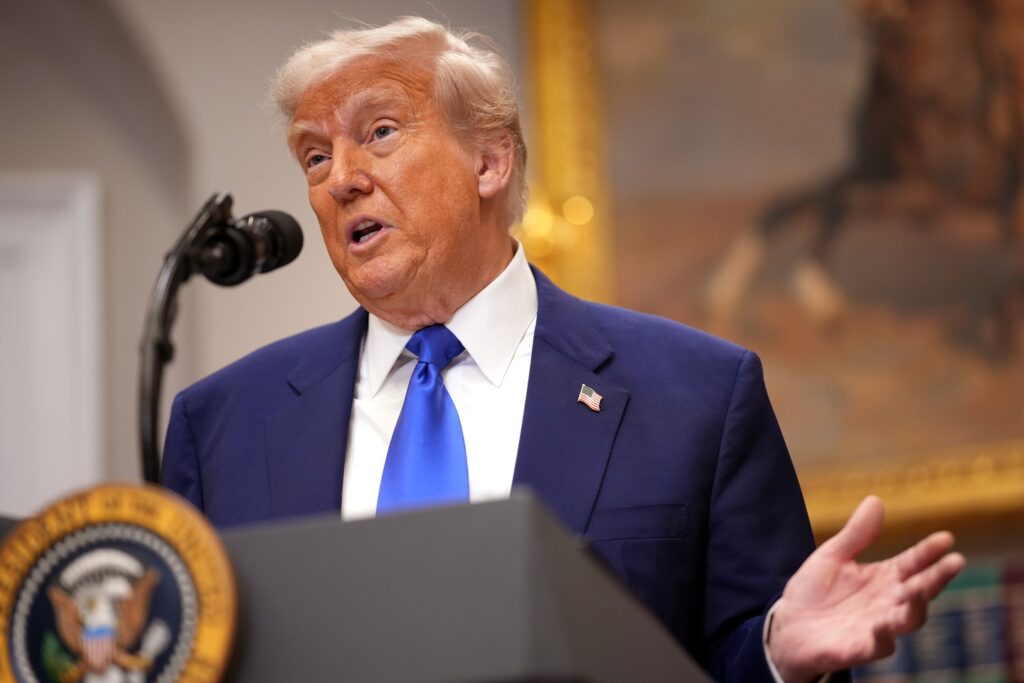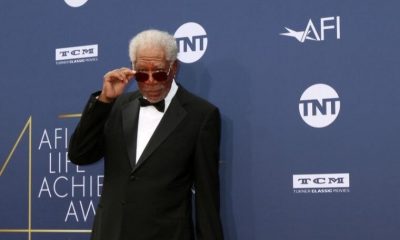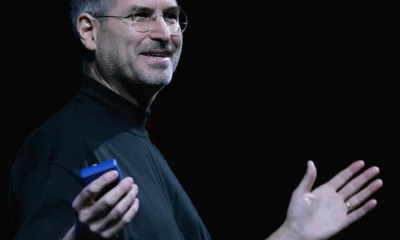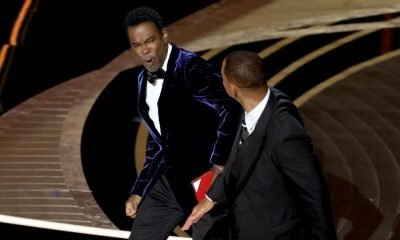Blog
Trump Sparks Backlash Over Strange WWII Claim About Europe
Former U.S. President Donald Trump has once again become the center of international controversy following a speech in which he made highly unusual and divisive claims about Europe’s celebration of World War II and the United States’ role in securing victory. His statements, made during a visit to U.S. troops in the Middle East, have drawn widespread criticism from historians, political commentators, and citizens across the globe.
In this article, we delve deeply into Trump’s remarks, the historical realities behind the Allied victory, the reactions from Europe and the wider world, and the broader implications of such rhetoric in the context of international relations and historical memory.
The Context of Trump’s Comments: Commemorating Victory in World War II
The controversy began earlier this year when Trump announced his intention to designate April 2 as “Liberation Day” in the United States, positioning it as a day to celebrate American military victories during World War II. This move was aligned with his ongoing “Make America Great Again” campaign theme, aiming to foster national pride.

However, at the same time, Trump made contradictory remarks about America itself, referring to it as a “stupid country,” confusing many observers and media outlets about his real intentions and views regarding America’s past and present.
The Qatar Speech: When Trump Targeted Europe
The situation escalated dramatically on May 15, during a speech delivered to American troops stationed in Qatar as part of a Middle East visit. Trump recounted phone conversations he had with European leaders around May 8 — the traditional date for Victory in Europe Day — when many European nations commemorate the defeat of Nazi Germany.
Trump expressed surprise and frustration that the United States appeared not to be celebrating the victory in the same way as other countries, including Russia and France. He said:
“We won the war and they helped, but without us, they don’t win the war. We’d all be speaking German — maybe a little Japanese too.”
These words not only oversimplified the complex nature of the Allied victory but also suggested that the efforts of the European Allies were secondary, igniting a wave of backlash.
Examining the Historical Accuracy: The Allied Victory as a Collective Effort
It is essential to understand the full context of World War II to appreciate the scale of the controversy sparked by Trump’s remarks. The victory in 1945 was the result of an unprecedented coalition of nations working together against the Axis powers.
The Soviet Union, for example, bore the brunt of the war on the Eastern Front, with an estimated 27 million deaths and massive destruction of infrastructure. Their relentless push into Nazi-occupied territories was critical to weakening Germany.
Meanwhile, the United Kingdom endured the Blitz — a sustained bombing campaign that tested the nation’s resilience — and contributed significantly to intelligence efforts, including cracking the Enigma code.
France, despite being occupied for much of the war, played a vital role through the Free French Forces and internal resistance networks that disrupted German operations. The United States’ entry into the war in 1941 provided critical military resources, manpower, and industrial production that helped turn the tide in favor of the Allies.
Reducing this multifaceted victory to a narrative in which the U.S. single-handedly won the war overlooks the sacrifices and contributions of these other nations and the complexity of global alliances.
Trump’s Specific Criticism of France: Mockery and Missteps
Perhaps the most contentious part of Trump’s speech was his pointed critique of France’s contribution. He claimed:
“I think we did a little more to win the war than France did. Now, we love France, right? But I think we did a little more.”
He then mimicked a French accent while mocking French President Emmanuel Macron, sarcastically quoting him as saying, “Donald, we are celebrating our victory over the Germans.”
This tone-deaf mockery touched a raw nerve in France, a country that suffered occupation, heavy casualties, and significant destruction during the war. France’s role in resisting Nazi Germany, both on the battlefield and through the internal resistance, is a source of national pride and is widely respected internationally.
Such remarks were widely seen as disrespectful and damaging to transatlantic diplomatic relations, especially given the importance of maintaining strong ties between the U.S. and European allies in today’s geopolitical environment.
The Redefinition of American Commemorations: New National Holidays
In an effort to assert American primacy in both world wars, Trump announced the establishment of two national holidays to celebrate U.S. victories: May 8, corresponding with VE Day, and November 11, traditionally known in the U.S. as Veterans Day.
Veterans Day honors all American veterans of all wars, not only World War I. It coincides with Armistice Day, which marked the end of World War I on November 11, 1918. Trump’s attempt to recast this day as a celebration of American victory, rather than a solemn remembrance of the cost of war and service of all veterans, was seen by some as an oversimplification.
This reframing of national remembrance into a purely triumphant celebration has been criticized as disregarding the somber aspects of war, including loss, sacrifice, and the shared nature of victory among allies.
How Europe and the World Reacted to Trump’s Remarks
The backlash was swift and widespread. Social media quickly became a forum for Europeans and others around the world to express their frustration and disbelief. Many argued that Trump’s comments ignored historical facts and disrespected the sacrifices made by their countries.
A Twitter user’s blunt summary — “And this is why Europe wants nothing to do with the US” — encapsulated a growing sentiment of exasperation. Another user highlighted the deep-rooted alliance and shared history by joking, “Without France, Americans would still be drinking Her Britannic Majesty’s tea.”
More pointed responses labeled Trump as uninformed or disrespectful, with some calling him a “moron.” The tone of the online discourse reflected not just disagreement but also offense at what many perceived as a revisionist and nationalist retelling of history.
The Importance of Allied Unity and Shared Historical Memory
World War II remains one of the most studied and memorialized conflicts in modern history precisely because it was won through cooperation and sacrifice by an international coalition. The Allied victory is celebrated worldwide, but it is also remembered as a costly and painful struggle that required unity and resolve.
Acknowledging the collective efforts of all Allied nations is fundamental to understanding how the war shaped the modern world order. Ignoring or minimizing the role of key players risks distorting history and undermining the bonds forged through shared struggle.
The Broader Political Implications of Trump’s Statements
Trump’s rhetoric fits into a larger pattern of his political messaging that emphasizes American exceptionalism and nationalism. While patriotism can be a unifying force, such statements can also deepen divisions at home and abroad.
In the international arena, this kind of rhetoric may strain diplomatic ties with European allies, who may perceive it as dismissive of their historical contributions and sacrifices. At a time when global cooperation remains crucial — whether in addressing security challenges, economic issues, or climate change — maintaining mutual respect is key.
Domestically, these comments may appeal to certain segments of the American electorate by reinforcing national pride. However, they risk alienating others who value historical accuracy and international partnership.
The Role of Historical Literacy in Public Discourse
This episode also highlights the importance of historical literacy among political leaders and the public alike. Understanding the complexity and nuances of history enables more informed and respectful conversations about the past.
Leaders, especially those with significant influence, bear a responsibility to avoid oversimplifications that can mislead or provoke unnecessary tensions. Instead, they should strive to promote unity through balanced recognition of all those who contributed to shared achievements.
Conclusion: The Need for Respectful and Accurate Remembrance
Donald Trump’s recent remarks about World War II and Europe’s celebration of victory days have sparked a major debate about history, nationalism, and international relations. While the United States’ contributions to the war are undeniable and worthy of honor, it is critical to remember that the Allied victory was a collective effort involving immense sacrifices by multiple nations.
In an increasingly interconnected world, how we remember history matters—not just for the sake of accuracy but for fostering cooperation, respect, and peace among nations. Simplistic or nationalistic retellings risk obscuring the truth and alienating allies.
Moving forward, it is vital to engage with history thoughtfully, acknowledging all perspectives and contributions. Only through such an approach can the legacy of World War II be honored in a way that unites rather than divides.
FAQs
Trump claimed Europe would be speaking German or Japanese without U.S. help in winning the war.
He impersonated a French accent and suggested the U.S. contributed more to the war effort than France.
He designated May 8 and November 11 as U.S. holidays to commemorate victories in both World Wars.
Many criticized his remarks as disrespectful and historically inaccurate.
-

 Blog4 years ago
Blog4 years ago10 Celebrities and Their Equally Gorgeous Siblings
-

 Blog4 years ago
Blog4 years agoThe highest-paid actors of all time are living large
-

 Blog4 years ago
Blog4 years agoHollywood Stars’ Instagram Photos viciously replayed
-

 Blog4 years ago
Blog4 years agoUpsetting And Creepy Facts We Wish We Could Erase From Our Memory
-

 Blog4 years ago
Blog4 years agoBecome Star Quality With These Celebrity Morning Routines
-

 Blog4 years ago
Blog4 years agoSome of Hollywood’s best-known movies have secrets that will shock you
-

 Blog4 years ago
Blog4 years agoThese Celebrity Couples Did Some Bizaree Things In The Name Of Love
-

 Blog4 years ago
Blog4 years agoUsing Everyday Items These People Made The Most Amazing DIY Creations
